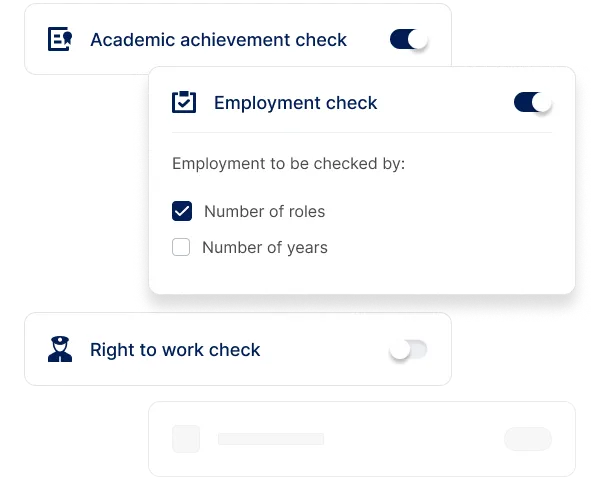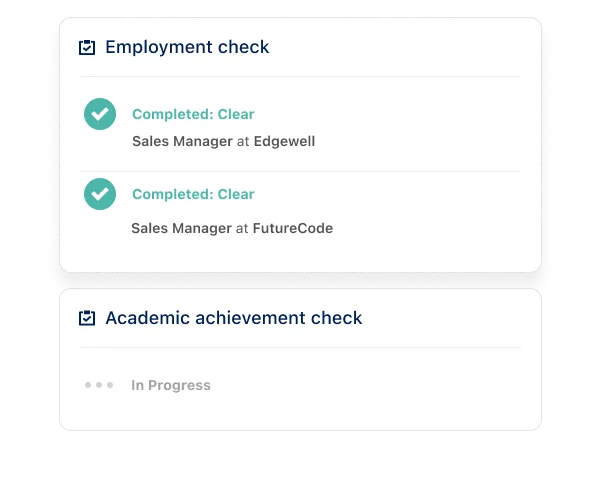Automated professional qualification checks made easy

Professional qualification checks - get results faster
Specific jobs need specific qualifications. In certain fields of education, law, medicine, and accountancy, among others, there is a requirement to hire individuals with the right credentials to carry out the job.
A professional qualification check gives you the assurance that the person you're considering hiring has the skills and experience needed to do their job.
Veremark verifies the validity of a candidate’s professional qualification, membership or certification is actually held, hasn’t lapsed, and is in good standing.
Trusted by the world's best workplaces






PROVEN
.png)
.png)




and Loved by reviewers
Easy
Reduce risk
No lock-in
Global checks
24/7 support
Faster time to hire
With our award-winning software, we’re the number one choice for leading brands and workplaces all over the world.
Proof of a qualification is a necessary stage of being approved for a job. Veremark can not only upload these documents and store them securely, we can also create a career passport on our product, Verepass, which the candidate can use to show future employers, saving time and effort in verification processes.
Integrations into your existing HR workflows mean this type of record can be combined with other confidential data to assess a candidate’s eligibility to work within the organization.
How it works



Related checks
FAQs
When applying for a job, some employers may ask to see proof of your qualifications, training or any necessary licenses. They should tell you what kind of documentation they will need and keep copies of these documents on file.
Generally speaking, study degrees like BA or BSc are called academic qualifications. Degrees for professions, such as MD or MBA, are referred to as professional qualifications because they point to the person's profession for his/her whole life.
A professional qualification - such as an MBA, LLM or Masters Degree - is usually obtained at the postgraduate level. Qualifications may comprise elements of teaching, law, business, and many more.
Academic qualifications are the formal qualifications that a person is awarded for completing a course of study in an academic institution. They are usually granted by a university, college or other educational institution.
Professional qualification includes a certificate, diploma, or degree that is awarded to someone who has completed a course of study in a particular field. There are many different types of professional qualifications. For example, a postgraduate degree in law would be considered professional qualification.
The definition of what is considered a professional qualification can change from one industry to another. Some professions such as doctors, lawyers, and accountants require a professional qualification. Professional qualifications provide a baseline for demonstrating expertise in a particular subject, job or industry. They are awarded by professional bodies to those who meet certain criteria.
A professional qualification confirmation gives you the assurance that the person you're considering hiring has the skills and experience needed to do their job.
There are many differences between an academic and professional qualification. The academic qualification is more theoretical and the professional qualification is more practical / vocational. Both qualifications have their own benefits and disadvantages.The academic qualification is valuable for people who want to pursue a career in academia or research, while the professional qualification would be better suited for someone who wants to work in a practical, vocational role in business or industry.
The academic qualification will help you understand how things work, but the practical skills learned from the professional degree will help you get a job. The academic degree requires you to study a lot of theory. On the other hand, the practical skills learned on a professional qualification course could be used more rapidly in your chosen future career.
Professional qualification is a recognised certificate that shows that you are qualified for the profession. It is usually issued by an accredited educational institution or professional body. It is also about the process of acquiring a set of skills, knowledge, and competencies that are generally recognized as being necessary to perform well in a profession.
In order to secure a professional, skilled job, you often need to have a degree in the field you are applying for. This is because employers want to know that you have the necessary skills and knowledge to do the job. Employers usually check professional qualifications when they are hiring someone.
Employers often prefer highly qualified candidates for employment. It's true - employers do want qualified people to work for them. So students have the advantage of having their qualifications during the interview process, as it will help them stand out.
Transform your hiring process
Request a discovery session with one of our background screening experts today.






